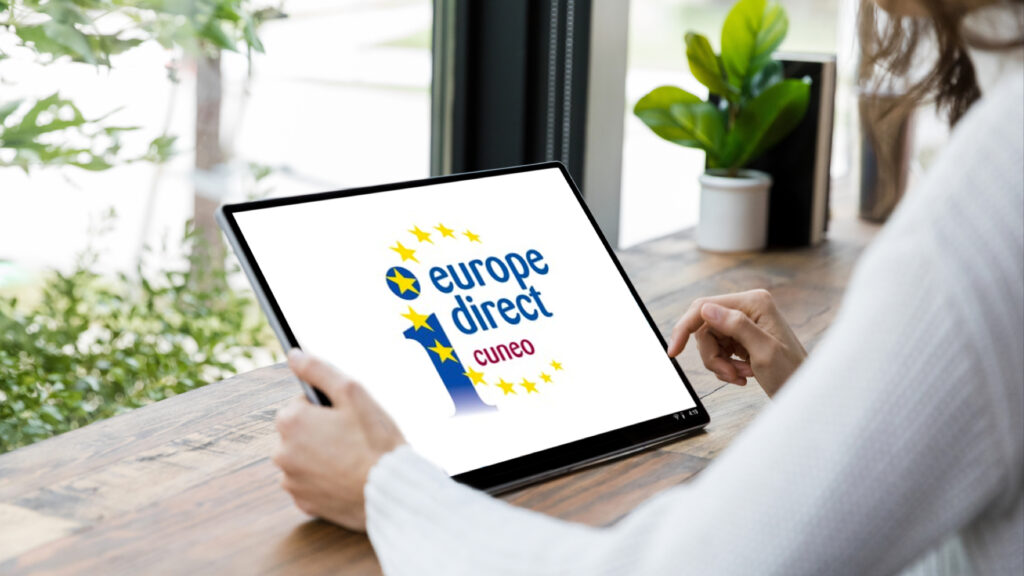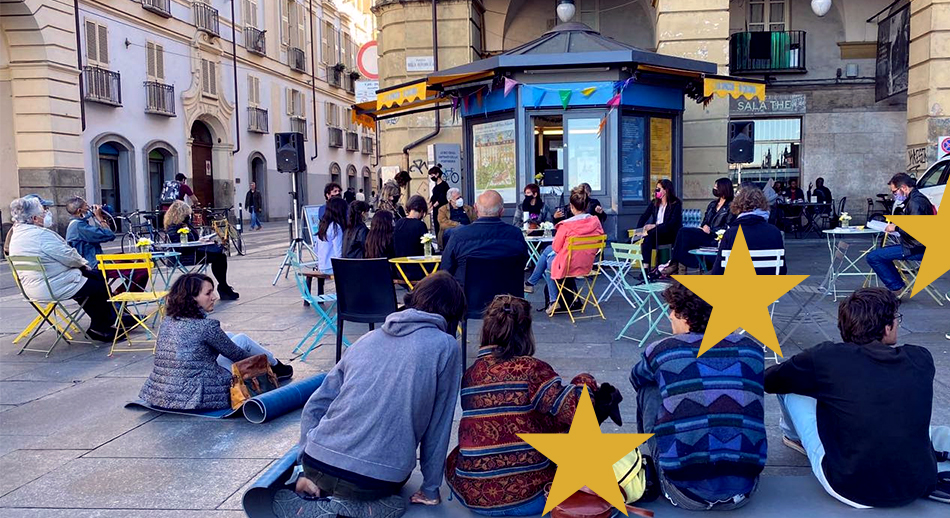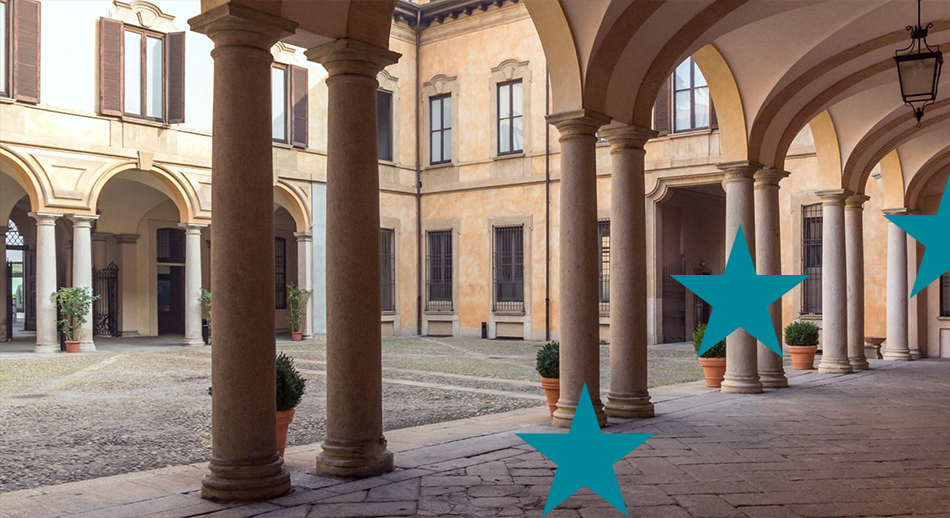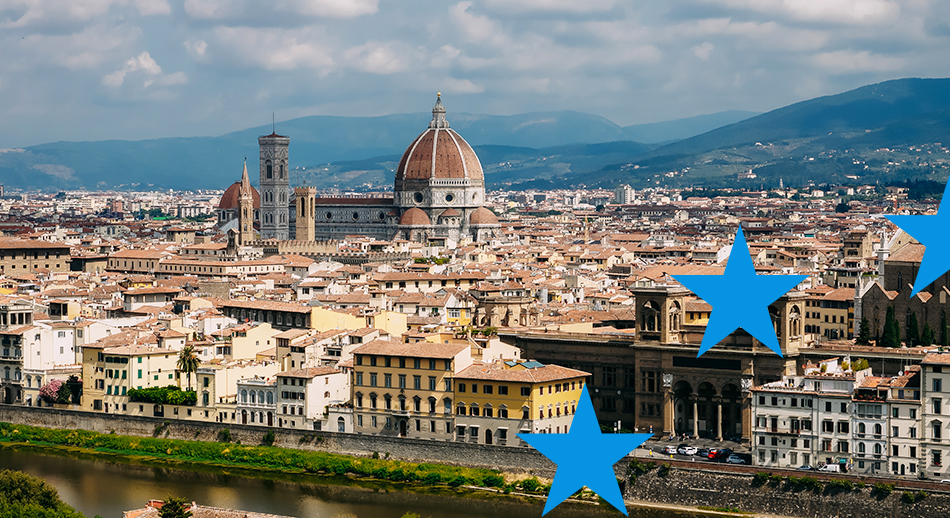We resume our review devoted to actors promoting Europe at the local level with a new in-depth look at Europe Direct centers. Today we are talking about the Europe Direct center in Cuneo, which serves a very large area of the local organisations in Piedmont.
The choice is not random: all Europe Direct centers are not the same. As mentioned earlier, all centers have a common coordination and mission, but each has its own specific vocation, plan of action, local organisations and history. The very establishment of a Europe Direct center is tied to the approval of a specific project in response to a European call for proposals.
The history of the Europe Direct center in Cuneo is very recent: it began in the summer of 2017, with the response to the call for renewal of the network of centers for the period 2018-2020. The actual activity began in the spring of 2018, but it already brings us many interesting experiences and a particular freshness in approaching citizens, students, businesses, institutions and associations in the local organisations of Piedmont.
We find out her story thanks to the account of Francesca Cavallera, who accompanied her and brought her up over the years, together with Francesca Attendolo and the Office Manager, Manager Bruno Giraudo.
What is the European Union for you? In what ways do you feel an active part of it?
Our history is recent, but we are well aware of the importance and difficulty of talking about the European Union. It is not always a linear and entertaining tale: but it becomes beautiful, fascinating, and enriching the moment it is conveyed in the language of the local organisations and in response to local needs.
There is a substantial correspondence between our raison d’être, the way we see the European Union, and what makes us feel an active part of it.
For us, the European Union is first and foremost a multiplier of opportunities and a presence close to citizens. This is also our role: to bring the opportunities offered by the European Union to our local organisations and to show citizens – in the language of citizens – how close the European Union is to us in everyday life.
Our center assimilates this concept to the fullest, because it serves a population with very diverse needs, spread over a very wide local organisations: not limited to the province of Cuneo, which alone is among the largest provinces in Italy. As such, ours is a particularly “territorial” center, in addition to being among the youngest centers in Italy.
All our activity carries this vision. For example, the center implemented the “Italy-France Cross-Border Dialogues” project in partnership with the Europe Direct centers of Piedmont, Aosta Valley and Auvergne-Rhône-Alpes. Working groups composed of students over 18, local organisations mayors, representatives of trade associations and Chambers of Commerce met in different cities to talk about the functioning of EU institutions, the EU budget and the role of the European Parliament, together with representatives of EU institutions.
It was a way to create opportunities that did not exist: never would such different and distant subjects meet to exchange views on a common citizenship issue. It was a way to bring the European institutions into direct contact with the citizenry; and it was also a way to promote citizenship as the real engine of the European Union, beyond the institutions. A small seed (250 people) to growEuropean public opinion in the local organisations. A seed that each participant will bring to his or her specific context.
The project has also been taken up in other cross-border contexts (e.g., between Sicily and Malta and between Veneto and Slovenia) and is the basis for Piedmont’s participation in the “Europe in my Region” initiative, which aims to enhance EU action and coordinate networks that talk about Europe in a given local organisations.
What is your target audience? What are your local organisations?
As part of our mission, we reach out to all citizens without distinction. We address, for example:
- To individuals who are curious about or need to learn more about a particular topic of European interest, or to businesses, organizations, and associations interested in practical information on accessing European funds and their proper use;
- To schools, one of the entities with which the centers most often collaborate, from preschools, through all levels of education, to universities and adult schools-and beyond (UNITRE is also among our supporters);
- To the general public, all citizens and local organisations potentially interested in “European civic education” actions. The past three years (2018-2020) have seen many actions in this regard, accompanying the 2019 European elections.
The presentation of the new call to continue our activities on the five-year period 2021-2025 was an opportunity to rethink and further deepen our contact with our local organisations and target audiences. More than 30 parties (the most diverse) have supported our candidacy: the local branch of the University, Levaldigi Airport, the Chamber of Commerce, CRC Foundation and many local associations and foundations.
Territorially, too, we have further strengthened our mission, which targets not only the Province of Cuneo but the entire Southwest Piedmont-a very large area that is complementary to that covered by the Europe Direct centers in Turin and Vercelli.
It is a mission that we feel is very important-we will have an answer in March about the new candidacy!
In what ways do you provide support? What tools and answers are you able to provide?
The activity of Europe Direct centers is traditionally a counter activity, meaning that stakeholders are received and assisted – and requests for information from our diverse target audience are handled. Of course, in the “Covid era,” the counter is always more virtual than physical, with assistance provided mainly by telephone, telematics, and e-mail.
We obviously receive many requests from companies interested in European funds and financing to develop their capacities and expand their activities (the sports, fitness, health and wellness sector has been particularly active recently); and requests in the same vein from organizations and associations.
The European Union is the promoter and co-financer of the center, so our assistance activities benefit from a “direct line” with the EU institutions: with the European Commission Representation in Italy (our main interlocutor) and with officials specializing in the various subjects on which we are asked for information and assistance.
However, the orientation of ours and other centers is to go directly to the citizenry. Do not just remain available for information and assistance, but head directly to the needs of the citizenry and local organisations with targeted activities, events and initiatives. We remain listening to best meet the needs of the moment in creative and innovative ways. For example, a recent conference-webinar addressed the topic of smart working from a European perspective, with a focus on women workers and featuring a European Commission official who is an expert on the subject.
In short, as much as people come looking for us, our goal is first and foremost to meet them! The “direct line” with EU institutions means that we often have European officials with expertise in the various subjects available for our events. You can follow all our activity on the center’s Facebook, Twitter and Instagram pages.
We organize many activities in schools and distribute free informational and educational materials. Sometimes even from a small activity, such as a simple distribution of materials, great surprises can arise. For example, one day a middle school asked us for informational materials and, after a while, an hour to spend with the students. In this hour, we witnessed a beautiful presentation of the European Union done in a variety of creative ways: audiovisual aids, games and interviews with citizens, musical performances with various instruments and various interpretations of the European anthem. Beautifully crafted performances as the institute includes classes with music specialization.
It was a very emotional moment. We saw in one hour a small Europe growing.
What do you recommend to an organization or person wishing to participate in a European project?
The first thing we recommend is certainly to inform yourself: do not underestimate the adventure of preparing and managing a European project, which is often more complex than you imagine.
In fact, the European Union is not “an ATM”-you cannot apply for funding without demonstrating the soundness of the proposal and the capacity of the proposing party. European funds make even substantial funding available, but they rightly require quality projects that are well aligned with the required priorities and managed in a maximally effective and transparent manner. This requires a great deal of work both when applying for funds and when reporting them. It is true that such work can be an obstacle in some cases, but it is also a guarantee of seriousness in the granting of funding.
We are also readers of your Guide: your advocacy on these issues is very important.
Two aspects seem particularly thorny to us in our experience of supporting local organisations on these issues:
- The search for European partners with whom to share project ideas and develop a project (particularly for directly managed projects). In this, the Europe Direct center can rely on a network of 450 centers in Europe, through which we can activate European colleagues in the search for partners;
- reporting, which is a part of project management that needs special precision and attention. It is advisable to organize the reporting work prior to the start of the project, to avoid problems in itinere (a fairly frequent aspect in requests to the center).
Can you tell us about a particularly significant experience of your support?
We wanted to tell our experience with some examples already in the previous points. We mention two more that we find interesting.
The first, particularly topical. European civic education has been introduced into school curricula up to 2nd grade, but still not all teachers have in-depth expertise on the functioning of EU institutions. The Cantieri di Cittadinanza project (carried out in collaboration with theAPICE Association of Cuneo) provides teachers with the tools and training to tackle the classroom teaching of European civic education.
The project had a difficult path because it was supposed to start in March, then was suspended because of limitations due to Covid-19 and resumed in October, with materials adapted for distance education. We try in this to help teachers in the difficult teaching management of this period, as well as in the specific subject matter.
In this we can benefit from increasingly effective online resources and materials provided by the European Commission and other EU institutions, such as those in the “Learning Corner” expressly dedicated to teachers.
The second, concerns a relatively little-known EU action, but one that can offer many opportunities for young people, theErasmus for Young Entrepreneurs (part of theCOSME program).
A young man (no longer a student), interested in deepening his skills in the area of digitization and innovation with an experience abroad, was able to have a stimulating experience (from which, hopefully, new opportunities and perhaps a new business may arise) in a start-up incubator in Paris.
It is another example of how Europe Direct’s support can open up new opportunities, which in some cases represent a real breakthrough for our beneficiaries. It is also an invitation, especially to young people, to stay informed and open to all the opportunities that Europe can offer!




